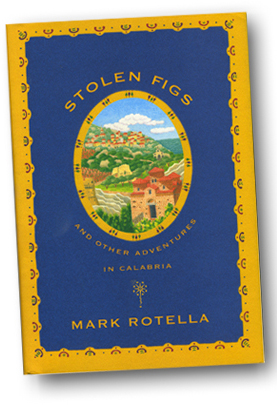Excerpt
The doors of the train opened at Naples. Shrill announcements twittered over the station PA system, babies cried, people argued, and beyond the tracks cars honked amid the din of Vespas and motorcycles. The passengers getting off the train squeezed their way past those trying to get on. Train workers, passengers, and merchants communicated with one another as if yelling across bleachers at a football game. The smell of fried zeppole and calzone filled the station. Vendors selling ice cream, water, and wine appeared and roamed the aisles, knocking on the doors of first-class air-conditioned compartments. When no one looked up, they opened the Plexiglas doors themselves. They were followed by Gypsy women begging for change, musicians playing guitars and accordions, and packs of children -- many with piercing green eyes.
My father and I, who had boarded in Rome, watched as the mob of people squeezed their way down the aisles, looking for seats. We were finally on our way to Gimigliano, in Calabria, the homeland of my grandparents.
I had been staying with my father in Perugia, where he was sculpting stone, during the month of July. I had heard so many stories about Calabria, where his parents had been poor farmers. I suggested that we visit their village, but he shrugged off the idea. "That was decades ago," he said. "Why go back to the past?"
"Why not?" I asked. "Anyway, what's so bad about the past?"
"Nothing," he said dismissively. Going back, I knew, would remind him of his mother, who had died the year before, and his father, who had died eight years earlier. My father pushed a hand through his full head of hair, a soft mixture of jet black and silver. "I don't even know if we have family there anymore. They've probably all died -- or moved to Torino or Milan."
"Well, why not find out? What's it gonna hurt?" I had already decided to go even if he didn't, but I knew the trip would be better -- would feel more appropriate -- if we went together. "I know you're at least a little curious. Anyway, look at it as the one time you'll be able to take this trip with your son."
My father laughed. "Jesus, you're such a romantic." He, too, is a romantic, but he wouldn't give in just then. He wouldn't admit that he might enjoy it. He fits the Calabrese stereotype of being stubborn or having a testa dura - - a hard head. My parents had taken my sister and me to Italy several times before, but this would be the first trip we had made south of Rome.
He looked at his watch. I knew what he was thinking. Our stomachs were on the same schedule.
"C'mon, let's get some dinner," he said. And with that, we walked to the trattoria up the street from the apartment we were renting.
At fifty-five, my father was fit and strong. Although he's a head shorter than I am, everything about him is grand: his nose, his eyes, his smile. And he eats with purpose and intensity.
By the time we finished dinner and a liter of wine, he had agreed to take a two-day trip south, returning to Perugia on Sunday. Two days seemed like no time. But it didn't really matter how long we stayed: I would finally see Calabria, and I would see it with my father. The compartments filled. New passengers greeted the old ones and, like next-door neighbors, fell into conversations about the weather -- hot even for July -- and the recent strike of railroad concession workers. I unbuttoned my shirt and leaned out the window, trying to find a breeze. A man in a light brown suit claimed a seat across from us and joined me at the open window. He turned and greeted me with an exhausted smile, his thick mustache glistening with sweat. The train coasted out of the station. The thunk of windows sliding open sounded throughout the car. Passengers flocked to the windows, letting their shirts fill with air.
As the train, an express, left old Naples, the yellow and pink seventeenth-century buildings of the historic center gave way to shoddy, colorless Mussolini-era tenements, which then yielded to the cinder-block Soviet-style structures of the 1970s, whose facades crumbled beneath their sagging balconies, then to suburbs, the Bay of Naples opening up on the west. Blue-and-white fishing skiffs lined the shore, their nets spread out to dry. To the east, Vesuvius's gaping crater broke through the smog.
This was Campania, and as the train continued south, I saw how the sirocco winds from Africa had dried the soil and left the bushes and trees scrubby and desiccated. Olive trees, fig trees, and grapevines -- the only vegetation that can thrive there -- lined the hills. The train passed villages and peasant farms, each smaller than the last. All the buildings were simple structures, painted pale yellow, olive green, or burnt red. All the shutters were closed, shading interiors that were most likely, in true Italian form, immaculately clean and organized.
This was the gateway to the south, the passage to Calabria.
Already I saw the difference. Campania's hills are not the rolling hills of Tuscany. Absent are wide-eyed pink travelers with their sulking kids. Absent are streets congested with souvenir shops. Absent are packed tour buses. Absent are crowded museums with their endless lines. Absent are English ex-pats and their summer villas. Absent are bilingual waiters and shop ladies. Absent are tourist menus in fourteen languages.
Within the train compartments and along the hallways, conversations grew comfortably loud; gestures became grander, more ebullient. An older woman (from Cosenza, Calabria, I found out) offered up nuts and fruits. A dapper Neapolitan pensioner talked local politics in a harsh dialect. The mustachioed man in the brown suit stood up to demonstrate the size of the fig trees in his backyard, his hands forming around each imaginary branch. The woman smiled and held up a white fig that she had picked from her sister's garden.
"My God," my father said as if to himself, "I've been all along here. I remember this." He eased back in his seat and stared out the window, mouth open. The right corner of his mouth turned up in a smile.
I went to the carrozza ristorante , the dining car, to get us some bottled water. Outside the open windows, the train hugged the ocean, the slate-blue water crashing against the rocks and boulders. Occasionally the jagged coast receded to an alcove of sandy shores. The sunbathers on these secluded beaches, reachable only by boat, didn't even register the train speeding above, but only stared out to sea, past their anchored motorboats rocking gently on the waves.
"The water is so blue, so light that it appears gray," someone said to me in Sicilian.
I turned to a deeply tanned man who shot me a smile almost as wide as his panama hat. The Sicilian version of a well-off, relaxed Florida retiree, he had unbuttoned his brightly patterned yellow-and-red batik shirt, exposing a bare chest the color of a ripe tomato; two thick gold chains, one with a pendant of a saint, broke the wall of red.
"So does the sky," I responded in Italian.
"The sky is gray," he said, turning to me with an indignant glare. It's the factories." He waved with one hand; on each finger was a large gold ring, embedded with colored stones that sparkled in the light. His hand floated through the air, then sailed downward like an unfolded tissue.
"The factories?" I knew that there was little industry for hundreds of miles south of Naples; Calabria's economy was especially depressed.
"Yes," he said, squinting as if about to impart a secret. "Up in the north. Those Milanese destroy everything, they're almost like the Germans."
"Did you come from Naples?" he went on.
I told him I planned to stop there on the way back. He rested his large, gentle hand on my shoulder. " È una bella città ," he said -- it's a beautiful city -- and told me that whenever he passes through Naples, if only for a few hours he ducks into a restaurant called Mimi alle Ferrovie, ablock away from the train station. He had just been there, in fact; grilled calamari, mussels in a marinara sauce, and white wine -- wine so distinct, he insisted that you can taste the ashy soil of Vesuvius, where the grapes are grown.
"Ma, io sono Palermitano ," he said, making sure that I understood that as a Sicilian from Palermo, he knew what he was talking about. "The marinara could have been a bit spicier, but the mozzarella di bufala. . . nowhere else can you find it so fresh!"
He explained what he did in his spare time, which was mostly what he was doing now, traveling and talking with strangers.
As the pensioner spoke, his sh 's and ch 's clicked between his tongue and teeth in the distinct, forceful Sicilian dialect, barely understandable to any Italian off the great island, much less anyone living north of Naples -- let alone me, who had learned Italian growing up in Connecticut and Florida and going to college in New York. Confident that people would work to understand him, he made no effort to slow or regulate his speech.
He glanced at his chunky gold watch and, as if he'd almost missed an appointment, announced, " Allora , it's time for a caffe ." We walked back to the bar -- he for his coffee, I for bottled water.
Copyright © 2003 Mark Rotella
From Stolen Figs: And Other Adventures in Calabria , by Mark Rotella (Author). © July 1, 2003 , North Point Press.

